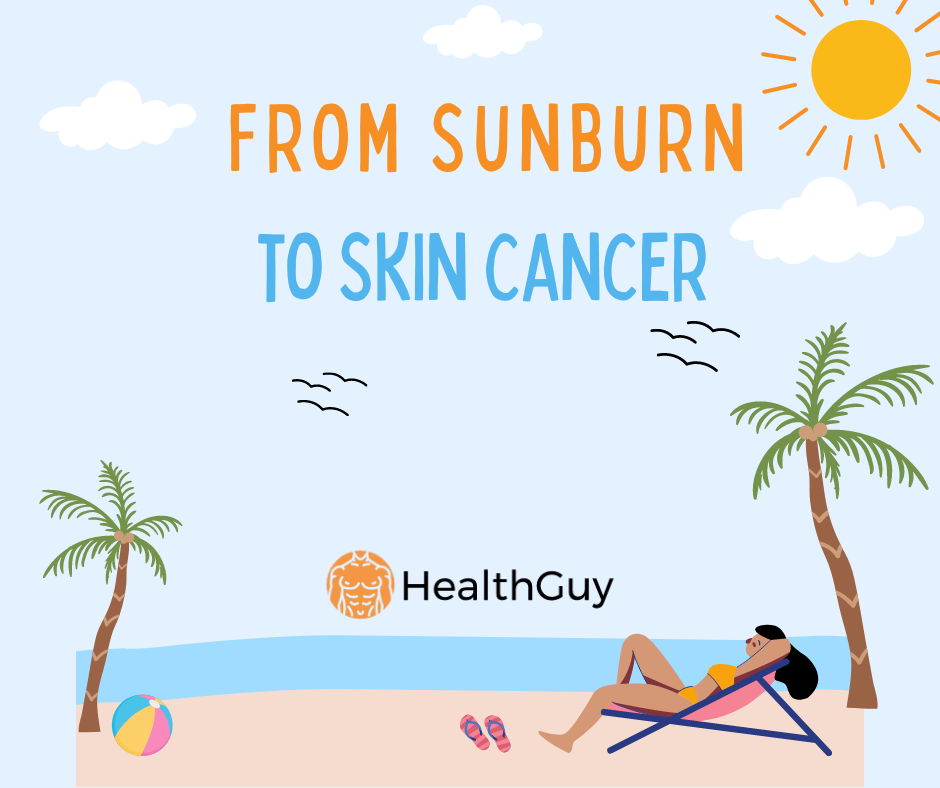
From Sunburn to Skin Cancer: Why Protecting Your Skin Matters
The sun is an essential part of life on Earth. It provides light and warmth and is a source of Vitamin D, which is important for bone health. However, exposure to the sun’s ultraviolet (UV) radiation can have harmful effects on the skin, leading to sunburn, premature ageing, and even skin cancer. In this article, we’ll explore the importance of sun protection and preventing skin cancer.
What is UV radiation?
UV radiation is a type of electromagnetic radiation that comes from the sun. It is divided into three types: UVA, UVB, and UVC. UVC radiation is mostly absorbed by the ozone layer and does not reach the Earth’s surface. UVA and UVB radiation, however, can penetrate the Earth’s atmosphere and can have damaging effects on the skin.
UV radiation damages the skin by causing DNA damage, which can lead to mutations that can result in the development of skin cancer. UV radiation can also break down collagen and elastin in the skin, leading to premature ageing, wrinkles, and sunspots.
Why is sun protection important?
Sun protection is important for several reasons. Firstly, it can help prevent sunburn and reduce the risk of skin cancer. Secondly, it can help prevent premature ageing and other skin damage caused by UV radiation. Finally, it can help protect the eyes from UV radiation, which can cause cataracts and other eye problems.
What are the risk factors for skin cancer?
The risk of developing skin cancer is higher for people who have the following risk factors:
- Fair skin, hair, and eyes
- A history of sunburns, especially during childhood
- A history of indoor tanning
- A family history of skin cancer
- A weakened immune system
- Exposure to radiation, such as during cancer treatment
- Certain types of moles or freckles
How can you protect your skin from the sun?
There are several ways you can protect your skin from the sun:
- Wear protective clothing: Wear long-sleeved shirts, pants, and hats that shade your face, neck, and ears.
- Use sunscreen: Use a broad-spectrum sunscreen with an SPF of at least 30, and apply it generously and often, especially after swimming or sweating.
- Seek shade: Stay in the shade during the hottest part of the day, usually from 10 a.m. to 4 p.m.
- Avoid indoor tanning: Indoor tanning beds expose your skin to UV radiation, which can increase your risk of skin cancer.
- Protect your eyes: Wear sunglasses that block 100% of UVA and UVB rays.
What is skin cancer?
Skin cancer is the abnormal growth of skin cells. There are three main types of skin cancer: basal cell carcinoma, squamous cell carcinoma, and melanoma. Basal cell carcinoma and squamous cell carcinoma are the most common types of skin cancer and are usually not life-threatening if detected early and treated. Melanoma is less common but is more dangerous if it is not detected early and treated.
What are the symptoms of skin cancer?
The symptoms of skin cancer can vary depending on the type of cancer. Basal cell carcinoma and squamous cell carcinoma may appear as a bump, a sore that does not heal, or a scaly patch of skin. Melanoma may appear as a new mole or a change in an existing mole, such as its size, shape, or colour.
How is skin cancer diagnosed and treated?
Skin cancer is usually diagnosed through a skin biopsy, which involves removing a small piece of skin and examining it under a microscope. If skin cancer is detected, the treatment options will depend on the type of cancer, its size and location, and the patient’s overall health. Treatment options may include surgery
How is skin cancer diagnosed and treated?
Treatment options for skin cancer may include surgery to remove the cancerous cells, radiation therapy, or topical medications. In some cases, a combination of treatments may be used. Early detection is key to successful treatment, so it’s important to regularly check your skin for any changes and to see a dermatologist if you notice anything unusual.
In conclusion, protecting your skin from the sun’s harmful UV radiation is crucial in preventing skin cancer and premature ageing. This can be achieved through a combination of wearing protective clothing, using sunscreen, seeking shade, avoiding indoor tanning, and protecting your eyes. Regular self-exams and seeing a dermatologist for any concerning changes in your skin can also help with early detection and successful treatment of skin cancer. By taking these steps, you can help keep your skin healthy and reduce your risk of developing skin cancer.
